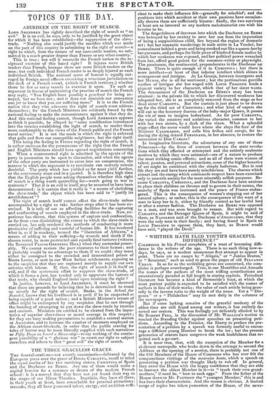THE THREE GRACELESS GRACES.
Tim funeral-orations—not exactly encomiastic—delivered by the European press over the grave of Donna CARLOTTA, recall to mind the equal merits of her two surviving sisters, CHRISTINA of Spain and the Duchesse DE BERRI. Any one of them would make a capital heroine for a romance or drama of the modern French school: it is a marvel that they have not yet found their way to the stages of our Minor Theatres. Imprimis, they have all three, in their youth at least, been remarkable for personal attractions: secundo, they all have possessed talent, energy, and ambition suffi-
cient to make their influence felt—generally for mischief; and the positions into which accident or their own passions have occasion- ally thrown them are sufficiently bizarre: finally, the two survivors at least are as immoral as any modern melodramatist can wish his heroine to be.
The forgetfulness of decorum into which the Duchesse DE BERRI was betrayed by her anxiety to save her son from the imputation of being a supposititious child, lies beyond the region of dramatic art ; but her romantic wanderings in male attire in La Vendee, her concealment behind a grate and being smoked out like a queen-bee by her pursuers, and perhaps the little piece of kindred female malice by which her weakness was exposed, and her political power wrenched from her, afford good points for the romance-writer or playwright. The passionate, the sentimental, preponderates in the Duchesse DE BERRI. There is quite enough of it in CHRISTINA: but there is more intellect—at least of that inferior intellect which shines in management and intrigue. At La Granja, between insurgents and her MuNoz, she is all for sentiment ; but the pertinacious guerilla warfare of intrigue she has waged with LOUIS PHILIPPE lends a piquant variety to her character, which that of her sister wants. The denouement of the Duchesse DE Biases story has been attained : in the private life to which her discovered weakness has relegated her, she is as completely removed from the stage as her dead sister CARLOTTA. But the curtain is just about to be drawn up for the third act of CHRISTINA; and what kind of capers she will cut as the honorary duenna of the baby-major Queen, it passes the wit of man to imagine beforehand. As for poor CARLOTTA, she varied the amatory and ambitious character, common to her with her two sisters, by a dash of the vixen. What a splendid stage-effect the scene would have where she slaps the face of the Minister CALOMARDE, and calls him bribon and carajo, for in- ducing the dying dotard FERDINAND, in her absence, to restore the succession to Don CARLOS !
In imaginative literature, the adventures of any one of these Princesses—by the force of contrast between the state revolu- tions which they effected or attempted and the entirely soubrette motives by which they were animated—are of a nature to produce the most striking comic effects; and as all of them were women of talent, passion, and personal attractions, some of the higher beauties of art might be combined with the simply ludicrous. But in real life they are and have been merely mischievous. The charms which attract and the energy which commands respect have been exercised only to unsettle society for the most miserably selfish purposes. Be- cause CARLOTTA, CHRISTINA, and the Duchesse have been anxious to place their children on thrones and to govern in their names, the anarchy of Spain was increased and the peace of France endan- gered. This is the consequence of woman's stepping out of her natural sphere ; or rather, this is the consequence of the want of a man to keep her in it, either by friendly control as her lawful lord or after a sterner fashion. The Duchesse DE BERRI was opposed to a man, and was soon brought to reason. But with regard to Calmar-re. and the Dowager Queen of Spain, it might be said of them, as NAPOLEON said of the Duchesse D'ANGOULEME, that they were the only men in their family ; and having found in Spain no Louis PHILIPPE to oppose them, they have, as BYRON would have said, "played the Devil."


























 Previous page
Previous page